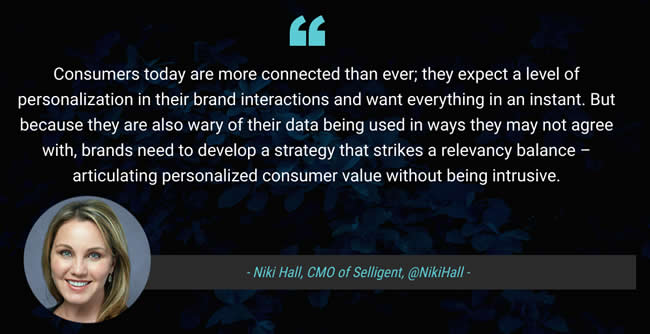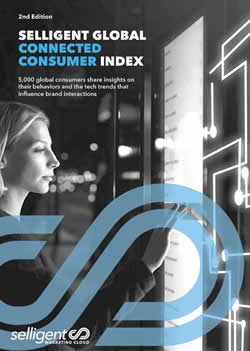The second edition of the Selligent Global Connected Consumer Index finds a connected consumer who is more demanding and at the same time more wary of sharing personal data with marketers, who need to find that relevancy balance between becoming too intrusive and offering valuable experiences across touchpoints.
Research recently again showed how privacy concerns affect consumers. Marketers underestimate these concerns as techlash has hit North America. There is also a disconnect between consumers and marketers. Social media usage, for example, is expected to decline while spending on social media by advertisers is expected to grow. What about other countries?
In a new report, the Global Connected Consumer Index 2019, marketing automation vendor Selligent (positioning itself as a marketing cloud and omnichannel marketing platform with some customer data platform capabilities) surveyed 5,000 consumers across the globe. Among the main findings: consumers are adjusting their behavior in various ways with, indeed, as we see report after report, privacy concerns clearly on the rise.

The expectations and demands of king customer remain very high
The Selligent Global Connected Consumer Index doesn’t just zoom in on social media. As an omnichannel marketing player, Selligent focuses on the global connected consumer from multiple angles. Let’s take a look.
In case you don’t know who Selligent is: once a Belgian marketing automation vendor the company moved to the US and, after having been acquired by private equity firm HGGC, Selligent and StrongView (once known as StrongMail) merged into one company.
Now those key findings. First, a few more words on those shifts regarding social media use. Per the second edition of the Selligent Global Connected Consumer Index, 41% of those polled agreed that they had reduced their use of social media due to privacy concerns.
While this means that most have not, apparently one-third of surveyed consumers quit at least one social media platform within the last 12 months because of privacy concerns. At the top of the ‘quit list’? You guessed it: Facebook. Taking into account that the AMA study predicted a decline in social media usage for the next three years, the next edition of the Selligent report might show even worse data.
Next, the rest of the takeaways. All in all, there aren’t too many surprises. A small majority of consumers, 51% to be exact, are still willing to share personal data for a more personalized experience, and the expectations of customers regarding connected customer experiences are high.
Generation Now wants speed and convenience. According to the survey expected customer service response timeframes are shortening as 96% of people now expect brands to respond within 24 hours of a flagged issue, and 90% expect a resolution to come within 24 hours. Customer-centricity isn’t enough anymore; it needs to be customer obsession nowadays.
On top of that, 71% of consumers expect brands to have all the information about them during an escalated brand interaction. The finding highlights the need for a full 360-degree view of king customer, whereby we’re not far from the earlier mentioned customer data platform (CDP) capabilities Selligent now offers.
As the Selligent Global Connected Consumer Index infographic below shows the preferred channels to communicate about customer service issues are still pretty traditional:
- 43% prefer to communicate via telephone
- 32% like email most
- 21% go for chat
Omnichannel rules while relevancy remains king
Another finding: omnichannel experiences reign. The opposite, of course, would have been surprising. 64% of pollsters take advantage of merging online and in-store shopping experiences for big-ticket purchases, preferring to research online but go in-store to purchase.
Big-ticket purchases include categories such as personal electronics, appliances, and vacations. 61% opt for purely digital experiences – research and purchase online. All depends on context, including type of product/service.
The human touch remains essential everywhere, and stores are still not dead. As written in the scope of evolutions in retail facilities and the digital transformation of retail, stores are simply evolving, although many will indeed close as well. Per the Selligent Global Connected Consumer Index 50% of consumers agree with the statement that consumers still expect brands to assist and give recommendations in-store.
For marketers who are looking for the magic formula to satisfy the ever more connected consumer, both the 51% still willing to share personal data for a more personalized experience and the others of which they have customer data, the conclusion is always that relevance is king (some will say context is king).
And relevance is still about your ‘quid pro quo’ such as being able to match excellent content (once deemed king in the early days of content marketing) or benefits such as promotions with their preferences/intent; increasingly ‘in the moment’.
64% of respondents claimed to be aware that their online activity is tracked but they welcome proactive product recommendations based on previous purchases (so we’re talking customers in the strict sense here). 47% find it ‘nice/helpful’ when they’re served ads based on what they have asked their voice assistants.
The global connected consumer isn’t that sure about voice assistants (yet?)
Speaking about voice assistants: the announcement of the Selligent Global Connected Consumer Index 2019 starts with voice assistants. We mentioned them a bit later as we’re closing a loop here.

According to the study, 69% of surveyed consumers find it “creepy” when they receive ads based on unprompted cues from voice assistants – can you blame them? 51% is worried that voice assistants are listening to conversations without their consent.
Interesting and potentially another token of a gradual increase of techlash in the future: the younger the consumer, the more inclined they are to believe they are listened to without their knowledge. 58% of Gen-Z respondents (ages 18-24) believe so while only 36% of Baby Boomers (ages 55-75) agrees.
With voice assistants (here’s that loop we’re closing) we’re back at where we started: those increasing privacy concerns. Despite the creepy aspect, 45% of respondents use voice assistants. But of course, that doesn’t mean they want the ads and the listening.
Summarizing the Selligent Global Connected Consumer Index findings
The big infographic below shows you some additional data and takeaways from the Selligent Global Connected Consumer Index.
Selligent CMO Niki Hall (who joined the company in May) resumes the findings (there are more than those just mentioned in the full report). She starts by pointing out that consumer trust is vital (and we can’t emphasize it enough, genuinely addressing privacy concerns – in practice – again is an important factor here).
Long-term customer loyalty remains the holy grail for marketers (but loyalty isn’t what it used to be with Generation Now and oh so many touchpoints) and consumers are more connected than ever.
Next editions of the Global Connected Consumer Index no doubt will conclude the same as touchpoints and adtech/martech technologies keep growing, and consumer IoT (the consumer-oriented part of the Internet of Things) is starting to outgrow spending in other IoT categories, to give one example.
Moreover, consumers want everything in an instant, expecting a level of personalization in their brand interactions, a trend that’s been ongoing for many years now.
But with the creepy stuff, the distrust and the changing attitudes regarding what you do with all this customer data as a marketer, the keyword in Niki’s comments is probably ‘balance’.
Quote: “because they are also wary of their data being used in ways they may not agree with, brands need to develop a strategy that strikes a relevancy balance – articulating personalized consumer value without being intrusive.” Truth.
If you want to share your data to get all the results from the Selligent Global Connected Consumer Index report, click here to get your copy.
Below is that infographic (yes, there is a typo, stay tuned, we alerted someone).


